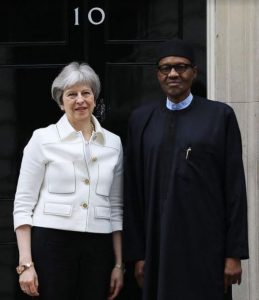The debate on what the current violence in Nigeria is all about and how best the country can be brought back from the present chaos, fear and uncertainty has escaped into contending options of de-escalation. And the debate is no longer an internal affair of Nigeria. Members of the Nigerian establishment, military and civilian, Western legislatures and journalists are developing and pushing contending narratives of what the spate of violence is all about. Conflict management experts would regard this phase as an even more complicated one as every narrative implies its own solution, involving power relationship.

Gen Buratai, COAS
While Lt. Gen Tukur Buratai, the Chief of Army Staff (COAS) is attributing the killings in Benue, Plateau, Taraba, Zamfara, Kaduna, Kano and other parts of the country to external and internal forces with the intention of destroying Nigeria’s corporate existence, Senate-President, Dr Bukola Saraki and Sokoto State governor, Aminu Tambuwal are thinking in a different direction: that the way forward is dispensing with existing service chiefs and bringing in “qualified people who can bring fresh ideas” to quote Aminu Tambuwal. In other words, they have reservations about the current security team. The British House of Lords which devoted a session to the issue much, much earlier than these standpoints has a sense of what is going on in terms of the narrative of a terrorist campaign to which the government of the day has not responded adequately. Vice-President Yemi Osinbajo, has also found himself on the same boat with Governor Tambuwal in favour of State Police. That is a bit surprising as the Federal Government has not always been disposed to the idea of State Police. Neither have the Nigerians been, not with memories of how the police was used by regional governments against opponents in the First Republic. Apart from memories of misuse of the Police in the First Republic, radical nationalists in Nigeria have opposed campaigns against centralised planning and state control and allocation of power resources such as the police. It is either the radicals would be able to mount a counter-narrative against State Police and succeed or prepare to live with State Police in post conflict Nigeria by developing measures early enough to ensure that it is not a case of flying from the frying pan right into the fire in the hands of governors.
Although the idea that the insecurity is foreign instigated and coordinated is not new, a service chief is saying so officially and in a substantial manner for the first time in recent memory. The COAS is speaking along the line the President has spoken, challenging the framing of the siege along identity fault lines such as ethnicity, religion and region. Doing so would, in his view, do the country no good and, hence, his call on Nigerians to unite to defeat the current challenge which he estimated to be serious. Although Gen. Buratai did not name names, when the COAS of a continental power says it is facing a foreign inspired nation breaking threat, he is automatically pointing at powers bigger than his own country or powers with strategic interests in his country. The question is, which might be such foreign interests seeking to dislocate Nigeria using terrorism and terrorists?
Neither Intervention nor two others who searched CNN website could locate the video embodying the quotation in question, a quotation attributed to Christiane Amanpour of the CNN is in circulation, categorically blaming President Buhari. Real or fake, that sense of the epidermis of violence is what played out in the session in the House of Lords, the senior members’ chamber in the British legislative set up. Member after member who contributed at the session drew attention to how too simplistic it is now to label the violence as an outcome of desertification and competition for resources, adding how the argument that Anti-Open Grazing laws triggered current spate of violence had been ruined the violence in Plateau which has no such law.
The members dismissed moral equivalence or the sufficiency of the Government merely urging all sides to seek dialogue and avoid violence, pointing out how stark the asymmetry between the conflict parties is and calling for its acknowledgment as such “by the UK Government in their characterisation and narrative of this violence”.
Arguing how what a particular member calls the Fulani militia have outpaced Boko Haram in the number of men, women and children killed in 2015, 2016 and 2017, the legislators indicated the acceptability of the label of “territorial conquest” and “ethnic cleansing” by which the Archbishop of Abuja described the violence in an outing in the UK daily, The Telegraph. This is more so with 380million unregistered guns circulating in Nigeria in addition to weaponry capacity of the killers, said to include AK47s and a rocket launcher and rocket-propelled grenades, in certain cases.

President Buhari and British Prime Minister Theresa May
One contributor made the chilling reference to how the last Plateau violence alone should serve as a wake-up call: “Are we to watch one of Africa’s greatest countries go the way of Sudan? Will we be indifferent as radical forces sweep across the Sahel seeking to replace diversity and difference with a monochrome ideology that will be imposed with violence on those who refuse to comply? We must not wait for a genocide to happen, as it did in Rwanda. Ominously, history could very easily be repeated”
The position of the British parliamentarians which would reverberate across the British establishment raises the question of which powers Gen Buratai might have in mind. They must be powers bigger than Nigeria in international politics, meaning it is no African country since none might want to get involved in wilfully taking on Nigeria, a continental power. Except the violence in Plateau, it is not clear why the COAS chose this moment to make the disclosure. Gen. Buratai who was speaking to newsmen at the commencement of the 2018 Nigerian Army Day Celebration in Maiduguri, the Borno State capital declared the army’s awareness of the many security challenges that have bedevilled this country in the last decade or so but said the service is far from sleeping but continuously exploiting all the linkages and leads towards addressing the security challenges. And he is sure the army would get to the roots of the entire crisis, militarily, stretching the analysis to a bit of chest beating: “Our security architecture as a country is one with a very positive outlook. “We have not only consolidated on the gains established in the fight against insurgency in the North East but have also progressed to the post stabilization phase where all efforts are geared towards ensuring displaced persons return to their biological homes which are now safe”.
In apparent reply to allegations of collusion, the COAS assures all Nigerians that “the Nigerian Army is for you and will continue to work for the common good of the country while professionally carrying out its constitutional responsibilities,” he added. He did not forget to add that the celebration provided the army the opportunity to celebrate its evolution, achievements as well as showcase what he called transformational strides in the area of innovation, research and development, civil military relations and technological advances. It is also to project the Nigerian Army as an instrument of national unity, integration and development, 155 years after it came to be in 1863. According to the COAS, the theme for this year’s celebration is ‘The Nigerian Army and National Security: A Panacea for Nigeria’s Economic Development”.
It bears repeating that the COAS was not replying the British parliamentarians although he was speaking two days after the session on Nigeria in the House of Lords. However, it is not just the British House of Lords that does not agree with the COAS, two well located political actors in the Nigerian establishment are in fact, calling for dispensing with the service chiefs. Dr Bukola Saraki and Governor Aminu Tambuwal’s reason for this is that the security chiefs are to be blamed for what Dr Saraki calls working across purposes and refusing to work in partnership with the National Assembly. Incompetent hands, they said, must give way to end the current situation. Urging President Buhari to do the needful in containing the continuous killings across Nigeria “because providing security rely squarely on government, particularly, federal government”, the Sokoto State governor says spade must be called a spade, arguing that there are qualified people who could bring fresh ideas”. Additionally, he wants all leaders at all levels to accept responsibility rather than continue to pretend that all is well with Nigeria. In his opinion, “everything is wrong with our nation and we must as a matter of urgency rise to the challenges.”
As it is, it is not the local – foreign axes that are offering contending narratives of what is to be done. The case for State Police in Nigeria as a way of containing violence and criminality is back on the agenda. The VP says it remains the surest way of tackling the current security challenges like herdsmen and farmers’ clashes in parts of the country. He was delivering a keynote address to the Third Anniversary of the 8th Assembly of the Lagos State House of Assembly Friday in Lagos. His argument is that policing is a local function requiring servicemen and women who must be able to speak and understand the local language. The theory, according to the VP, is that a policeman without the local language facility confronted a major disadvantage. State Police, said he, is the position of the ruling party, adding that it is not plausible to effectively police a country Nigeria’s size from a central command at Abuja. “It is just impossible. We must have state police and community police”
The VP’s position coincidentally agrees with that of Governor Tambuwal of Sokoto State who is saying that the security situation resulting to the incessant killings in the country had justified the case for state police. In apparent solidarity with a fellow governor, Abdulaziz Yari of Zamfara State who ‘resigned’ recently, protesting the reality of being but a glorified Chief Security Officer who controls no security apparatuses. Now, Tambuwal argues that governors have to evolve and be allowed some measures of control of security personnel in their respective states. Frowning at a plausible scenario where a Commissioner of police could ignore a governor’s call “over an important security issue”, Tambuwal says “Whether we like it or not, there is seeming justification for State Police and there is seeming justification for state government to have some measures of control over security personnel”. The governor was using the opportunity of declaring open the National Executive Council meeting of the Nigeria Union of Journalists (NUJ) in the state.
Which of these narratives would prevail is what the world is watching and waiting for because whichever one prevails has its own policy implications for Nigeria’s future.




























